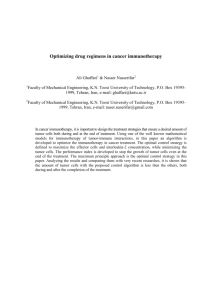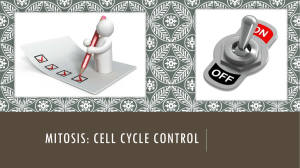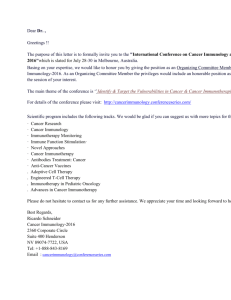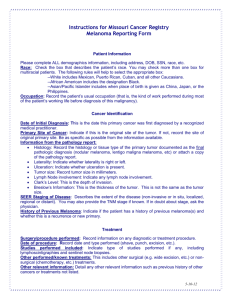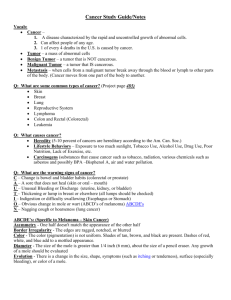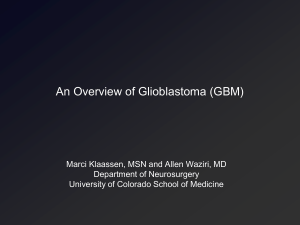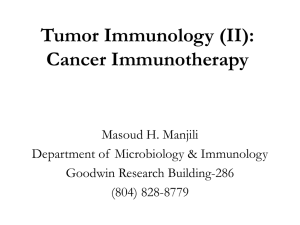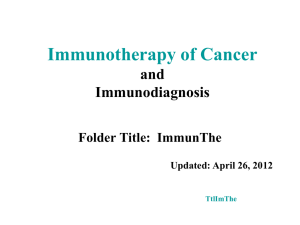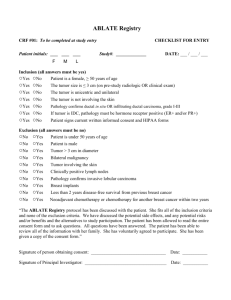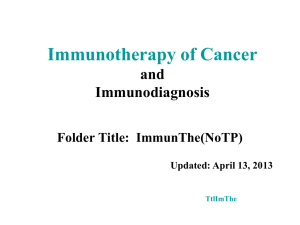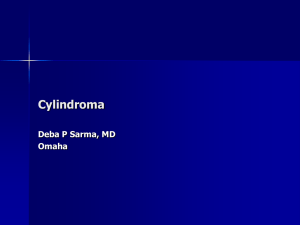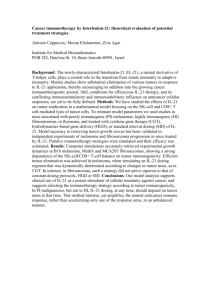Amazing Samples - Tumor Saving Lives
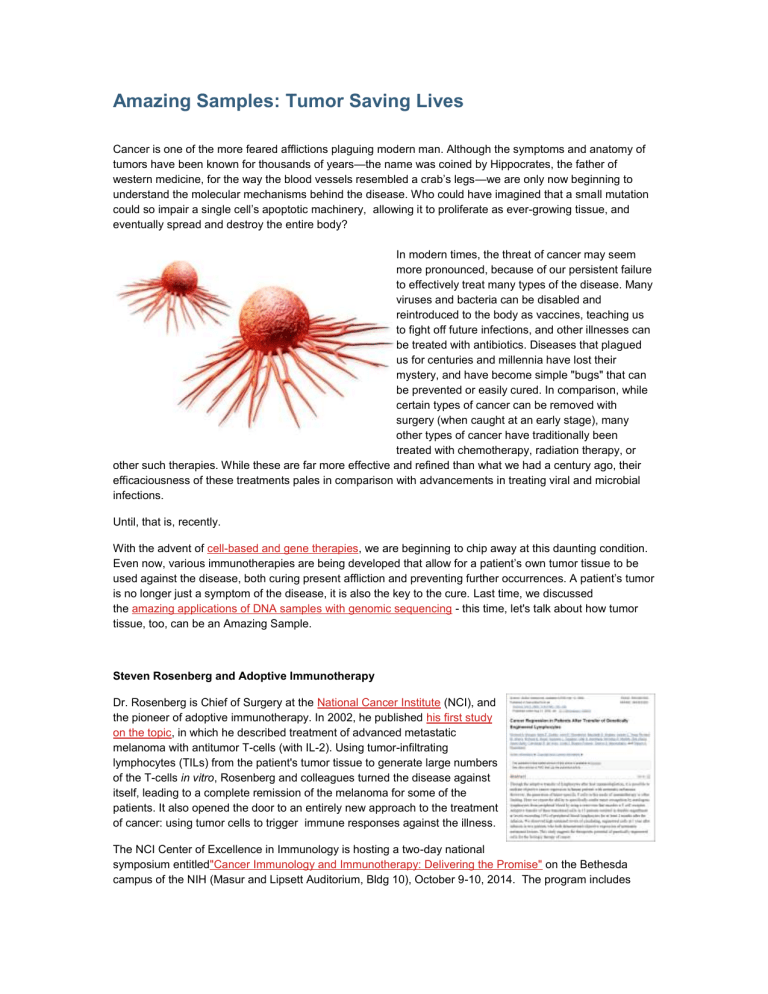
Amazing Samples: Tumor Saving Lives
Cancer is one of the more feared afflictions plaguing modern man. Although the symptoms and anatomy of tumors have been known for thousands of years
—the name was coined by Hippocrates, the father of western medicine, for the way the blood vessels resembled a crab’s legs—we are only now beginning to understand the molecular mechanisms behind the disease. Who could have imagined that a small mutation could so impair a single cell’s apoptotic machinery, allowing it to proliferate as ever-growing tissue, and eventually spread and destroy the entire body?
In modern times, the threat of cancer may seem more pronounced, because of our persistent failure to effectively treat many types of the disease. Many viruses and bacteria can be disabled and reintroduced to the body as vaccines, teaching us to fight off future infections, and other illnesses can be treated with antibiotics. Diseases that plagued us for centuries and millennia have lost their mystery, and have become simple "bugs" that can be prevented or easily cured. In comparison, while certain types of cancer can be removed with surgery (when caught at an early stage), many other such therapies. While these are far more effective and refined than what we had a century ago, their efficaciousness of these treatments pales in comparison with advancements in treating viral and microbial infections. other types of cancer have traditionally been treated with chemotherapy, radiation therapy, or
Until, that is, recently.
With the advent of cell-based and gene therapies , we are beginning to chip away at this daunting condition.
Even now, various immunotherapies are being developed that allow for a patient’s own tumor tissue to be used against the disease, both curing present affliction and preventing further occurrences. A patient’s tumor is no longer just a symptom of the disease, it is also the key to the cure. Last time, we discussed the amazing applications of DNA samples with genomic sequencing - this time, let's talk about how tumor tissue, too, can be an Amazing Sample.
Steven Rosenberg and Adoptive Immunotherapy
Dr. Rosenberg is Chief of Surgery at the National Cancer Institute (NCI), and the pioneer of adoptive immunotherapy. In 2002, he published his first study on the topic , in which he described treatment of advanced metastatic melanoma with antitumor T-cells (with IL-2). Using tumor-infiltrating lymphocytes (TILs) from the patient's tumor tissue to generate large numbers of the T-cells in vitro , Rosenberg and colleagues turned the disease against itself, leading to a complete remission of the melanoma for some of the patients. It also opened the door to an entirely new approach to the treatment of cancer: using tumor cells to trigger immune responses against the illness.
The NCI Center of Excellence in Immunology is hosting a two-day national symposium entitled "Cancer Immunology and Immunotherapy: Delivering the Promise" on the Bethesda campus of the NIH (Masur and Lipsett Auditorium, Bldg 10), October 9-10, 2014. The program includes
recent advances in the field and should be an exciting forum for discussion and debate on the current understanding of the immunotherapy of cancer.
Sessions will include:
Adoptive Cell Therapies
Genetic Engineering of the Immune System
Checkpoint Modulators
Other Approaches to Cancer Immunotherapy
Argos Therapeutics and the Arcelis™ Personalized Immunotherapy Platform
Argos Therapeutics , a biopharmaceutical company based out of the Research Triangle Park in North
Carolina, just went public earlier this year, and their flagship technology is a new personalized adoptive immunotherapy
– Arcelis. They collect both the patient’s tumor tissue and their dendritic cells, and use a proprietary process to train those dendritic cells to target the tumor cells’ antigens, specifically using the tumors’ RNA. Currently they are still in Phase 3 clinical studies, but the technology is showing a high level of promise, and they are already planning on using the technology for other previously-undefeatable conditions, starting with HIV. (See Argos Therapeutics official company description below or visit their website to learn more).
See how Argos Therapeutics' technology utilizes David's own tumor cells in this video story of autologous cell therapy
Michael Hanna and Vaccinogen
Michael G. Hanna, Jr., Ph.D., former director of the NCI/Frederick Cancer Research Center, realized a different way to use tumor tissue against cancer. As early as 1999 , he was already researching the potential of an elegantly simple cancer vaccine that relied on training the immune system to better recognizing the heterogeneous array of antigens in tumor cells (active specific immunotherapy), rather than the in vitro style of adoptive immunotherapy. When mixed with a BCG vaccine, a patient's irradiated tumor cells become collateral damage, and the immune system comes to recognized tumor-specific antigens as targets. His biopharmaceutical company, Vaccinogen , is already testing this technique against multiple types of cancer, having conducted Phase 3 against stage II colon cancer, and Phase 1 studies in stage III colon cancer, melanoma, and renal cell carcinoma.
The Clinical Proteomic Tumor Analysis Consortium
Even when the tumor samples aren't actively being used to develop a personalized treatment, they still contain important biomarkers that can be used to further research cancers, potentially leading us to prevent cancer before it even occurs. This is the goal of the Clinical Proteomic Tumor Analysis
Consortium (CPTAC), which was launched by the National Cancer Institute to not only analyze such biomarkers, but to release such relevant information to the public. Not only are they analyzing which exact proteins might be important analytes for cancer detection, but they are also developing new assays for any such potential biomarker candidates. This information can assist many other projects, including Abcodia and their development of early detection techniques for ovarian cancer - read our eBook on their project for more on that story!
